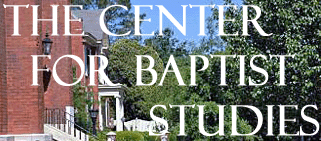|
Does it really matter if you are a Baptist? After all,
God's children include people from all denominations. All groups are
trying to help people love God and each other. Why is it important to
claim a Baptist heritage?
Baptists certainly do not have all the answers. We
have much to learn from the broader Christian community. Likewise,
Baptists are fellow laborers with other denominations and ought to
work with other denominations. Only after affirming our connectedness
with the larger Christian family can we legitimately claim our Baptist
heritage.
The Protestant Reformation

Martin Luther
Baptists are one branch of the Protestant Reformation
that Martin Luther started in 1517. Protestants disagreed with the
Roman Catholic church's understanding of salvation. The Reformers
declared that we are saved by grace through faith, not by the
sacraments of the church.
The Catholic church said Luther's teaching was heresy.
Luther quoted the Bible to support his teachings. Catholic church
leaders claimed to be the official interpreters of scripture. They
told Luther his interpretation was mistaken and held him accountable
to teach and preach according to the official Catholic tradition of
biblical interpretation. Luther responded:
"Unless I am convicted by Scripture and plain reason
-- I do not accept the authority of popes and councils, for they have
contradicted each other -- my conscience is captive to the Word of
God. I cannot and I will not recant anything, for to go against
conscience is neither right nor safe. God help me. Amen."
Luther claimed to be directly accountable to God for
how he interpreted scripture. Then he translated the Bible from Latin
into German so others could read the scriptures and decide for
themselves what the Bible said.
When the scriptures were taken from the exclusive
domain of church leaders and given to all Christians to read and
interpret, the biblical doctrine that all believers are priests was
reclaimed.
Luther and most of the other reformers, emphasized the
priesthood of believers to buttress support for the teaching of
salvation by grace. A small group of reformers insisted that the
doctrine also had profound implications for the life of the church.
This small group of reformers maintained that every
believer had the right and responsibility to directly relate to God
and to act as a priest of God. These reformers were labeled "radicals"
because they wanted to pattern church life in accord with the New
Testament where every member was commissioned and gifted for service.
Radical Reformers: A Community of Priests

Balthasar Hubmaier
The Anabaptists envisioned the church as a community
of priests. They changed church life radically.
First, they insisted that church members must be
believers -- not infants -- because becoming a priest required a
conscious decision to live for Christ. They only baptized believers.
Their churches were called believers' churches because every member
had been baptized after making a personal affirmation of their belief
that Jesus is Lord. This is not to imply that they did not pray for
their children or provide them an environment that pointed toward
Christ. They insisted, however, that the decision to make a faith
commitment must be personal.
Also, they de-emphasized distinctions between clergy
and laity, instead focusing upon the spiritual gifts of each person.
They held that all members of the church were equal ministers
(priests) with various spiritual gifts. Consequently, everyone in the
church would have a role to play in ministry, and everyone would have
an equal voice in helping to discern God's will for the congregation.
These radical churches became known for equality among members and for
congregational decision-making.
A key issue for these independent, autonomous
congregations concerned how would they relate to other congregations?
Other denominations set up a church hierarchy to control and
coordinate the work of the churches. The radical reformers rejected
such a structure. Instead they proposed a voluntary association with
other autonomous churches to work on projects of mutual concern. They
called for cooperation between churches not control over churches.
Unlike many churches of their day, the radical
reformers called for complete religious liberty for everyone --
believer and non-believer. No one should be forced by the state to
believe a certain way. Nor should the church use the power of the
state to advance its agenda. The church should advance the kingdom of
God's work in society through the persuasiveness of it ideas and
actions, not coercion.
The Emergence of Baptists

Roger Williams
Baptists emerged out of this radical reformer milieu
in the early 1600s. They first appeared in Holland (among English
immigrants) and among separatists in England.
It wasn't long until Baptists were found in the
English colonies.
Baptists championed liberty of conscience. Roger
Williams was expelled from Massachusetts Bay Colony for insisting that
"the commonweal cannot without a spiritual rape force the consciences
of all to one worship." Liberty of conscience meant
freedom for every believer to serve and worship God
according to the dictates of conscience, freedom for each believer to
interpret the Bible under the direct guidance of the Holy Spirit,
freedom of the local church to discern God's will, and freedom of
religion for all people. All of these practices had roots in the
radical reformation.
From the very beginning, the emphasis on freedom and
conscience led to a great deal of diversity within Baptist ranks. Some
early Baptists accepted predestination, others rejected it. Some
worshipped on Sunday, others on Saturday. Some advocated two
ordinances, baptism and Lord' supper, while others added a third, foot
washing. Some favored revivals, others ridiculed them. Some defended
slavery, others fought it. Some had women preachers and deacons,
others rejected them. Some sang hymns, others wouldn't. Baptists have
always been diverse and disputes with other Baptists have been
frequent.
Within our diversity, however, some core convictions
about church life have remained constant:
All genuine faith springs from a voluntary response of
trust in Christ
All people have the right to religious freedom
All members of the church are believers who have made
a personal commitment to Jesus as Lord and Savior
All members are to interpret the scriptures and help
the church discern God's will
All members are gifted to serve as God's ministers or
priests
All churches are autonomous and free to cooperate with
other churches as they choose
Claiming Our Baptist Heritage
Is this Baptist heritage worth claiming? It is worth
claiming for at least three reasons.
Our Baptist heritage is valuable to humanity.
Baptists are Great Commission Christians. We take
seriously the Lord's command to make disciples throughout the whole
world. Genuine conversions spring from a voluntary response of faith
in Christ. We lay the groundwork for the gospel and gain a hearing for
the "good news" by advocating the separation of church and state and
championing religious freedom for everyone. In an age of religiously
motivated wars, terrorism, and genocide, the world desperately needs
Baptists to once again become champions for liberty of conscience and
religious freedom.
Our Baptist heritage is scriptural.
In the New Testament only believers are baptized and
incorporated into the church. Christians form a "royal priesthood" (I
Pet. 2:9). As his priests, we have been given diverse spiritual gifts
and all the gifts are necessary and valuable to the church's ministry
(I Cor. 12:7-27). Likewise, we are equal priests in God's family. In
Christ there is neither Jew nor Greek, slave nor free, male nor female
(Gal. 3:28). New Testament churches were diverse in practice but found
ways to cooperate in mission endeavors (Acts 15:1-35).
The New Testament church did not employ the state to
spread the gospel. It used the power of persuasion not coercion. The
early church knew that genuine convictions spring from a voluntary
response of faith in Christ.
Our Baptist heritage is valuable to the broader Christian
community.
Martin Marty, the premier church historian in America
and a Lutheran minister, described the "Baptistification" of American
Christianity. He suggests that Baptist insights about church life have
influenced other denominations in America and transformed the way they
operate. Baptists have influenced other denominations to give more
authority to the local congregation, to give the laity a more active
role in the church, to advocate religious liberty, to allow for
greater diversity in biblical interpretation among their members, and
to realize the necessity for each member to have an experiential
faith.
Our Baptist heritage must be kept whole and healthy in
order to continue influencing other denominations. Likewise, Baptists
must be willing to listen to and learn from other denominations. It is
a two-way street. |




